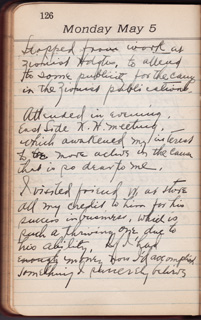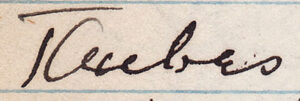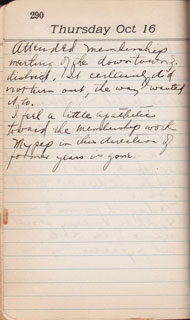
Attended [at Cooper Union] massmeeting of the
United Hebrew Trades, launching the
campaign for $150,000 for the Jewish
workers in Palestine. —
For the first time in its history
Jewish organized Labor in the U.S.
is taking an active part in the
Jewish Homeland, This certainly
was an epoch making affair
former Anti Zionists delivering
Palestine loving speeches.
I was happy to hand in the
check for $125.00 that was
collected today in my place of
employment.
This was a fine beginning
May their efforts be crowned
with success.
————-
The collection at the place [shop]
gave me joy
—————
Matt’s notes
Perhaps guided by my own shitty February mood, I’ve been paying close attention this month to signs of loss and sadness in Papa’s diary, whether overtly stated or between the lines. I think a slight correction is in order, though, since I may have lost sight a bit of Papa’s innate hopefulness and sense of duty. The diary is a private place where he feels free to acknowledge his doubts, but I don’t think he let other people perceive him as doubtful, and I don’t even think he saw himself that way. It surprises him to feel lonely, and it disappoints him when others act badly, but I don’t think he ever resigned himself to loneliness or disappointment no matter how burdened he felt.
As my wife (Stephanie) pointed out, for Papa to collect $125 from his shop was no small feat. It was a big deal when he got a $5 raise a few weeks ago, so we can be sure he didn’t collect the money in $5 or $10 increments from a few dozen people; he must have approached and gotten donations of a dollar or less from scores of people, all of whom respected him, found him trustworthy, allowed him to persuade them. That’s not how people react to someone who appears downtrodden or out of sorts. His joy over the donations he collected was sincere, as was the pleasure he took in giving his sister a housewarming gift the day before.
I need to keep this in mind as I think about how Papa’s generosity and soothing ways survived so many trials. His difficulties and depressions were symptoms of his personal circumstances, but he didn’t feel they were his lot. He may have been Romantically inclined to describe his disappointments in dramatic tones, but he was not romantically attached to them, and in fact eventually outran them.
———-
Additional Notes
I haven’t learned much specifically about United Hebrew Trades and their relationship to Zionism, but Jewish labor organizations with strong socialist ties (the UHT was founded by Morris Hillquit, a Russian Jew who also helped found the Socialist Labor Party) did tend to spurn any causes without immediate relevance to their domestic members. In fact, Jewish labor didn’t get entirely behind Zionism until the 1930’s (at least according to the 1950 Jewish American Yearbook) so the meeting described above really was an “epoch making affair.”










